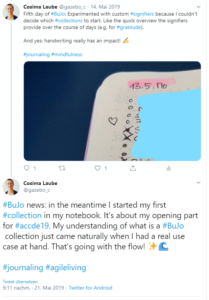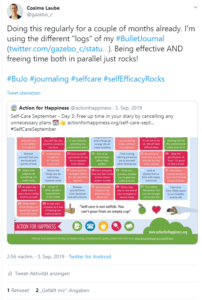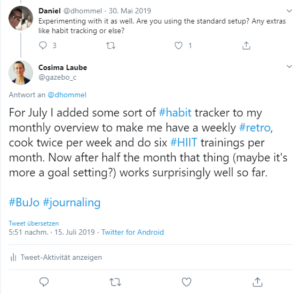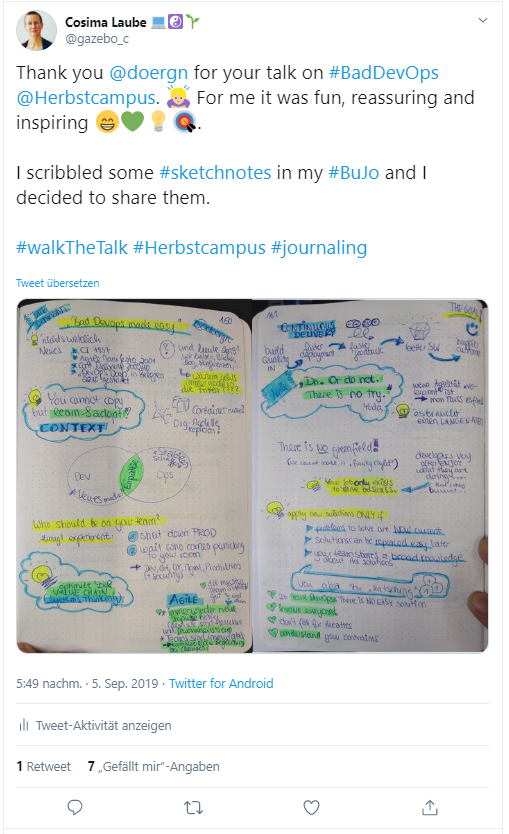After reading the first part of this “Beware of Bullet Journaling”-series, I hope that – IF you practised this method to free your self to achieve what truly matters to you – already stopped doing it. 😉
If not, here are three more arguments why you should really stop it! In fact, Bullet Journaling can significantly increase your satisfaction with:
- Flow
- Being organised
- Building sustainable habits
So stop Journaling now, or better: never start it before regular practise changes your life for the better.

Flow
You hate going with the flow. Clear siderails from the very beginning matter most to you – and once you started something, you really stick to the “rules” – and nothing else.
So, once you already started your Bullet Journal, neither experimenting with different Signifiers would be okay – nor would it ever come to your mind to add another Collection to the blank book to handle a new project.
A collection in Bullet Journaling can be quite handy to e.g. prepare, organise and manage an upcoming challenge. It is set up as quick as you write a suitable headline on a blank page. Then you add the collection’s headline as an entry to the Index and the collection lives as long as you need it.
For me the first collection of that kind (i.e. managing an upcoming challenge, achieving a bigger goal than suitable for the Daily or Weekly Log) during my BuJo journey was the opening speech for Agile Coach Camp Germany, an Open Space (OS) event on agile coaching, working and living with the theme ‘Back to being’ for the two OS days in 2019.
Tipp: When a collection’s lifecycle has come to an end, I slightly cross the entry in my Bullet Journal’s index. This gives me a better, quicker overview of the stuff which is still relevant.
Being organised
Being organised is totally NOT for you… because you really hate having it both: effectivity, getting the right stuff done, AND having more time at the same time. Beware of the Bullet Journaling method, it can support you in achieving this!

Also the idea of having everything in ONE place, right at your fingertips, almost frightens you. No more scattered notes or pieces of paper laying around.
Having everything in one place could mean collecting Sketchnotes or MindMaps from Conferences, MeetUps or other events in your Bullet Journal. This gives you the opportunity to access all the ideas, inspiration and knowledge a couple of days or weeks afterwards – and to then put them into action.
Here are just a few of the sketchnotes I scribbled in my two last Bullet Journal books. (click to enlarge the content)
Furthermore, having everything in one place could also mean having a place to draft something creative like a doodle to concentrate in hard-to-follow-situations or practise your visual vocabulary.
Pro-tipp for having everything in your place: get yourself a good blank book, one with a small pocket in the back-cover (I use those from Cedon). This is helpful to accommodate one or two important additional sheets during the lifetime of one BuJo book (and you WILL have those ;-)).
Building sustainable habits
Now off to the last reason for today. You definitely should NOT do Bullet Journaling because once you start with BuJo, it could easily happen that you find yourself building new, helpful, healthy habits. Even worse: you could get rid of habits you wanted to get rid of since quite a while.
Integrating a Habit Tracker e.g. into your Monthly Log can support building new, sustaining habits:

Adding weekly retrospectives helps me i.e. to identify which habits-in-incubation I want to keep and where I better spent my energy somewhere else.

To give you a glimpse what could be possible: since I started Bullet Journaling in May – amongst others – I created these habits which now integrate (almost) effortlessly into my life:

- regular strength work-out (3 times per week)
- preparing/cooking healthy food (also for workdays)
- daily mini-retrospective with gratitude practise
- weekly review & planning for next 7-10 days
- 5 mins of formal breathing meditation every morning
Another perk: sharing YOUR personal ways of creating habits (e.g. on Twitter) can inspire other people, encouraging each other to try new things or “just” keep going during the rough phases of building a new habit.
Now what?
You liked what you read? I’d love to hear, what was especially valuable to you!
You longed for something? Let me know so this blog can improve.
You are also writing a (Bullet) Journal? Please share YOUR views why others should definitely (not ;-)) start one!
Watch for the next part of this series coming soon…




